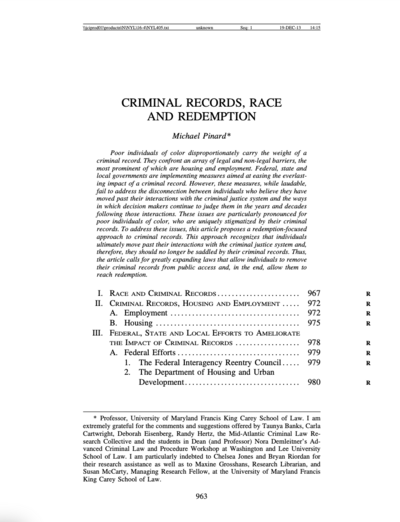Criminal Records, Race and Redemption
Journal Article
Clean Slate
Topics:
Collateral Consequences
Criminal and Juvenile Records
Employment
Housing
Reentry population:
Adults
Date:
Source:
New York University Journal of Legislation and Public Policy
Criminal Records, Race and Redemption
This article, from the New York University Journal of Legislation and Public Policy, explores the long-term and often permanent impact of criminal records on individuals of color and, by extension, families and communities of color. Regardless of offense type, the barriers to moving past an interaction with the criminal justice system are often insurmountable.
This article focuses on two of the most intractable barriers: the ability to secure housing and employment. Because these two staples of day-to-day life are essential for stability, security and self-worth, the barriers caused by criminal records can prevent individuals from ever moving past their interaction(s) with the criminal justice system.
- Part I provides a brief overview of race and criminal records.
- Part II examines the housing and employment barriers confronting individuals with criminal records.
- Part III details some federal, state and local efforts to ameliorate housing and employment barriers.
- Part IV argues that a redemptive-focused approach to criminal records is necessary to truly address the disproportionate burdens these records impose on individuals of color and to afford them meaningful opportunities to support their families and strengthen their communities.




